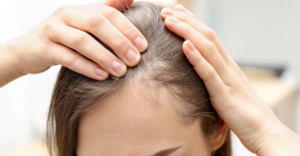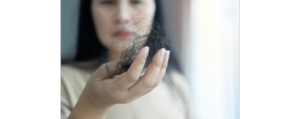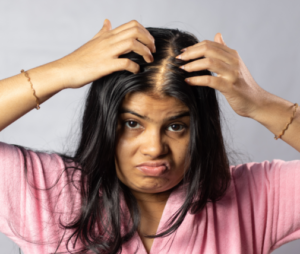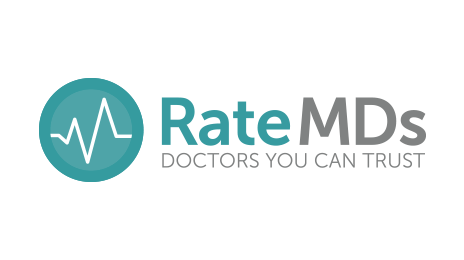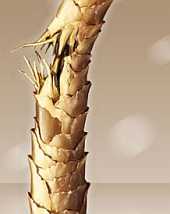 Hair and health go hand in hand. Your hair, just like your fingernails, provides great insight into the health of your body, from psychological issues to physical maladies, it’s important to listen to instincts and your body when it comes to your health. If you’ve come to see changes in your locks,especially if drastic, it may be time to see your doctor. It’s important to catch problems when they’re relatively small and manageable. So what’s your hair saying?
Hair and health go hand in hand. Your hair, just like your fingernails, provides great insight into the health of your body, from psychological issues to physical maladies, it’s important to listen to instincts and your body when it comes to your health. If you’ve come to see changes in your locks,especially if drastic, it may be time to see your doctor. It’s important to catch problems when they’re relatively small and manageable. So what’s your hair saying?
1. You’re a Compulsive Perfectionist
A tendency to (literally) pull at your hair, eyebrows, or lashes when you get stressed can signal a perfectionist personality, suggests a Canadian study in the Journal of Behavioral Therapy and Experimental Psychiatry. The researchers explain it this way: When you don’t meet your own impossibly high standards, hair pulling can be a way of alleviating the frustration and dissatisfaction. But this coping tactic goes a little deeper than run-of-the-mill perfectionism—it’s a compulsive disorder known as trichotillomania, and if you’ve got it, cognitive behavioral therapy (learning a less overwhelming way to organize your workflow and deal with frustration) may help.
2. You’re Under a Huge Amount of Stress
It’s normal to shed 80 to 100 hairs a day, says New York City dermatologist and psychiatrist Amy Wechsler, MD. But if it looks like you’re losing more than what’s normal for you, it could be a sign of telogen effluvium, a period of (totally reversible) hair thinning brought on by psychological and physical stressors, like an illness, pregnancy, or a period of depression. This shift often isn’t noticeable until 3 to 6 months after the event.
No need to panic: If a big stressor is behind your hair loss, it’ll grow back on its own, though it can take another 3 to 6 months before it’s back to normal. In the meantime, Wechsler suggests focusing on overall wellness: Get 7.5 to 8 hours of sleep a night, do stress-busting activities, and consider taking 5 mg of biotin a day to stimulate growth.
3. You’re Not Eating Well
 If your hair looks dull, brittle, or is thinning, it may be time to rethink what you’re putting in your body. “When it comes to healthy hair, your overall diet is critically important,” says Wendy Bazilian, RD, author of The SuperFoods Rx Diet. “If you’re eating a highly processed diet, any nutrients you do get are shuttled to your body’s crucial operations, like your heart and other organs,” she says. Your hair won’t turn brittle and dull after one #3 combo, but a long term lack of nutrients can damage your strands. To prevent the issue altogether incorporate a diet heavy of whole, rather than processed foods, that are full of color. Your mother was right; you need to eat your veggies. That will give your body—and hair—what it need’s to stay healthy.
If your hair looks dull, brittle, or is thinning, it may be time to rethink what you’re putting in your body. “When it comes to healthy hair, your overall diet is critically important,” says Wendy Bazilian, RD, author of The SuperFoods Rx Diet. “If you’re eating a highly processed diet, any nutrients you do get are shuttled to your body’s crucial operations, like your heart and other organs,” she says. Your hair won’t turn brittle and dull after one #3 combo, but a long term lack of nutrients can damage your strands. To prevent the issue altogether incorporate a diet heavy of whole, rather than processed foods, that are full of color. Your mother was right; you need to eat your veggies. That will give your body—and hair—what it need’s to stay healthy.
4. Are You Eating the Right Fats?
If you’ve recently slashed fat from your diet in the hopes of losing weight, your hair may respond by becoming weak. Not only does dietary fat contribute to the health of your hair, it also helps your body absorb key fat-soluble nutrients, like vitamin D, which has been associated with hair loss in women that don’t get enough. Luckily, you can eat your fat and be healthy, too—if you choose the right ones. Focus on eating foods rich in omega-3 fatty acids and monounsaturated fats. Consider this your license to load your cart with satisfying goodies like oily fish, avocados, dark chocolate, and olive oil.
5. You’re Not Drinking Enough Water

The Institute of Medicine recommends getting 2.7 liters a day from beverages and water-rich foods. (That’s about four 24-ounce water bottles.) Your skin, hair, and muscles will soak it up and you’ll love how you look and feel. If your lackluster locks are accompanied by hot flashes, night sweats, and lack of energy, the common denominator is likely dehydration.



